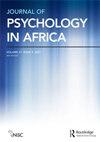小学生校园欺凌中的防卫者自我效能感与防卫者行为:感知责任和性别的作用
IF 0.8
4区 心理学
Q3 PSYCHOLOGY, MULTIDISCIPLINARY
引用次数: 0
摘要
本研究考察了小学生欺凌防御者自我效能感与欺凌防御者行为的关系,以及感知责任和性别在这一关系中的作用。参与者包括来自中国小学4至6年级的1310名学生(男生占47.7%,女生占52.3%;平均年龄10.97岁,SD = 0.98岁,年龄范围8 ~ 14岁)。参与者分别完成防卫者自我效能感量表、感知责任量表和参与者角色行为量表。采用结构方程模型,结果表明欺凌防御者自我效能感直接预测小学生的欺凌防御行为。在男生中,责任感知强化了欺凌卫士自我效能感与欺凌卫士行为之间的关联,而欺凌卫士自我效能感与欺凌卫士行为之间的关联在女生中高于男生。这些研究结果表明,集体主义文化背景下小学生的亲社会行为受到性别的影响,因此在设计反欺凌干预措施以提高学校公民意识时,性别是一个重要的考虑因素。本文章由计算机程序翻译,如有差异,请以英文原文为准。
Defender self-efficacy and defender behaviour in school bullying of primary school pupils: The role of perceived responsibility and sex
This study examined the relationship between bullying defender self-efficacy and bullying defender behaviour in primary school pupils and the role perceived responsibility and sex played in this relationship. Participants included 1 310 pupils from Chinese primary schools attending Grades 4 to 6 (boys = 47.7%, girls = 52.3%; mean age = 10.97 years, SD = 0.98 years, age range = 8 to 14 years). Participants completed the Defender Self-Efficacy Scale, the Perceived Responsibility Scale, and the Participant Role Behaviour Scale, respectively. Following structural equation modelling, the results indicated that bullying defender self-efficacy directly predicted bullying defender behaviour in the school pupils. Perceived responsibility strengthened the association between bullying defender self-efficacy and bullying defender behaviour partly in boys, while the association between bullying defender self-efficacy and bullying defender behaviour was higher in girls rather than boys. These findings show that prosocial behaviour of primary school children from a collectivist culture is influenced by gender, so that gender is an important factor to consider when designing anti-bullying interventions for improved school citizenship.
求助全文
通过发布文献求助,成功后即可免费获取论文全文。
去求助
来源期刊

Journal of Psychology in Africa
PSYCHOLOGY, MULTIDISCIPLINARY-
CiteScore
1.70
自引率
16.70%
发文量
62
期刊介绍:
Findings from psychological research in Africa and related regions needs a forum for better dissemination and utilisation in the context of development. Special emphasis is placed on the consideration of African, African-American, Asian, Caribbean, and Hispanic-Latino realities and problems. Contributions should attempt a synthesis of emic and etic methodologies and applications. The Journal of Psychology in Africa includes original articles, review articles, book reviews, commentaries, special issues, case analyses, reports and announcements.
 求助内容:
求助内容: 应助结果提醒方式:
应助结果提醒方式:


